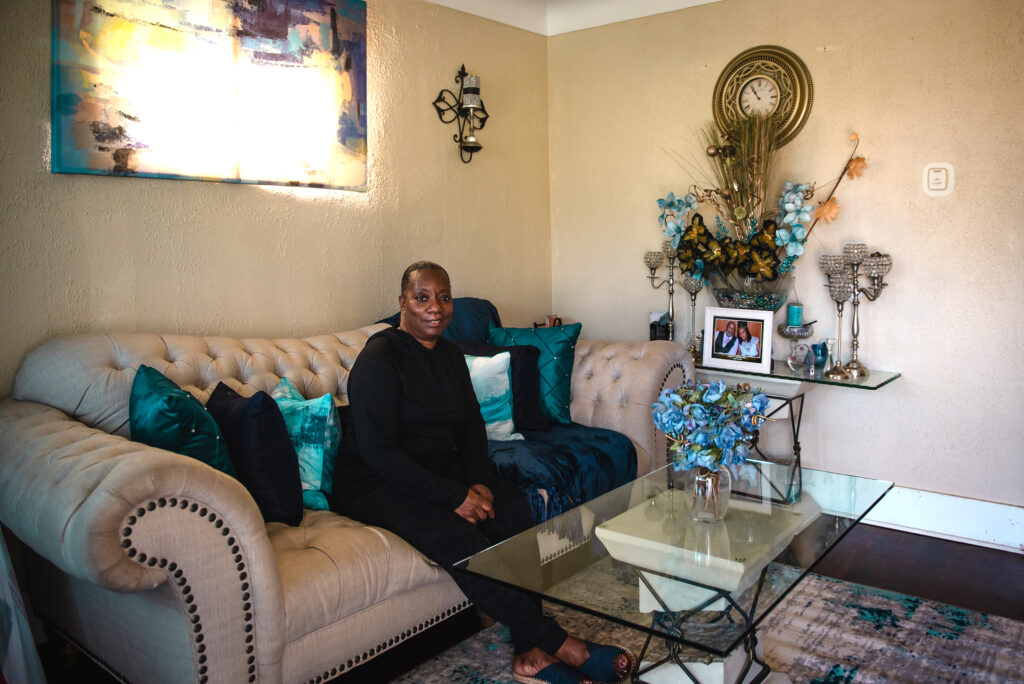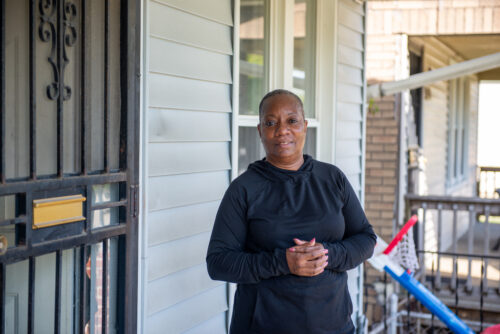If every home has a story, then the little three-bedroom bungalow on Milner Street in Detroit weaves an inspirational tale of hardship and triumph – themes the home’s owner, Renetta Frazier, knows well.
In 2020, Renetta and her husband, Marvin, lost the home to property tax foreclosure. After avoiding notices because they lacked resources to catch up on payments, Renetta came home one day to find a note and lifeline taped to the front door.
Renetta was eligible for the Detroit Land Bank Authority’s (DLBA) Buy Back program, which provides a pathway to homeownership for people living in land bank-owned houses. She picked up the phone and dialed the number on the note.
As a part of the program, Renetta was required to complete a free home preservation course and financial assessment with Matrix Human Services, a longtime United Way for Southeastern Michigan partner. Through a partnership with the DLBA, Matrix, the City of Detroit and United Way for Southeastern Michigan, Matrix provides participants in the Buy Back program with personalized, one-on-one financial coaching, career coaching, connections to job training and other supports to help people improve their financial stability and prepare to regain their homes.
These comprehensive supports provided to Renetta and other Buy Back participants are part of Matrix’s broader work as a partner in United Way’s Greater Detroit Centers for Working Families (CWF) Network. This network includes 12 community-based partners like Matrix that offer coordinated services to help people grow their earnings and better manage their money.
“I’m thankful; Just thankful,” Renetta said, a wide grin covering her face. She was in attendance at a recent DLBA exit event where dozens of program graduates received the title to their homes.
“We all fall short sometimes,” she said. “When you come out on the other side, you have to celebrate and give thanks.”

A STORY ABOUT A HOUSE
Weeks later, at the house on Milner Street, there’s a feeling of gratitude for every milestone, and optimism for chapters not yet written.
Renetta looks radiant, sitting in her living room painted in her favorite color – turquoise. She eagerly shows off the home’s interior design and the renovations made in recent years – the latest transformation for the nearly 100-year-old home.
From 1925 when the first brick was laid through the 1950s and ’60s, when a mass exodus led many white residents to the suburbs, the home, and the surrounding neighborhood on Detroit’s East Side, have survived many ups and downs. In the early 2000s, the long-neglected home got a second chance when it was sold to Renetta as a HUD home.
Renetta’s aunt, who lives next door, was the one who suggested the newlyweds purchase the home and fix it up. She even helped with the $5,000 down payment.
“I moved out of my parents’ house and into this house,” Renetta said. “It was a big moment for me. A lot of pride came with owning a home, even though it needed a lot of work. For a long time, buying a house didn’t seem possible, but my aunt helped me out.”
This time when Renetta needed a hand, it was the Matrix that stepped in, helping her develop a plan to save the $1,000 required to repurchase the home through the Buy Back program.
United Way has long supported the Buy Back program through Matrix as part of our work to help more households in our region reach stability.
“This is one of my favorite programs we offer,” said Kalaya Long, economic mobility initiatives manager at United Way. “There’s nothing else like it out there with the ability to stabilize families and communities.”
BUILDING FOR THE FUTURE
In 2022, 125 people exited the Buy Back the program. More than 1,100 individuals have graduated and received the title to their homes since the program began in 2015.
Participants in the Buy Back program are also eligible to take part in other programs and services offered through the CWF, which acts as a coordinating umbrella for a robust set of wraparound services that help working families get ahead by improving their long-term financial positions.
Javay Coleman, senior financial coach at Matrix, said it’s rewarding work.
With some programs there’s not a tangible takeaway, but in this case, they’re walking away with the deed to their home. That’s generational wealth. That can be life-changing.
Historically, people of color have experienced systemic racism and discriminatory practices that inhibited their ability to build generational wealth. As a result, the racial wealth gap has continued to widen.
United Way funds CWF and other efforts to help families access programs that keep their homes safe, lower housing expenses and protect them from eviction and foreclosure. Working side by side with our partners, we’re helping families get out of crisis — and stay out. The network was founded in 2008 and is co-managed by Detroit Local Initiatives Support Corporation (LISC) and United Way. Since 2008, the CWF network of partner organizations has served more than 16,000 local families, helping them more consistently make ends meet, feel less financial stress, and build a strong financial foundation for the future. During the organization’s last fiscal year, United Way provided $1.2 million in core grants to CWF partners.
“By partnering with United Way, we’re able to reach a lot of people we wouldn’t otherwise reach,” said Tahjma Vaughn, project manager at DLBA. “United Way offers a lot of valuable advice and community connection. And having Matrix as a part of that mix is invaluable to us and the clients.”
DOING THE WORK
Javay said being a financial coach has made her think a lot about her own life.
“Some people are facing serious challenges,” she said. “It’s so important for all of us to be transparent about our own experiences so that we can help someone else and so that we’re not all falling off the same cliff.”
The Buy Back program is just one way that people can get connected to CWF services. The CWF network serves a wide range of people in the Detroit area seeking to improve their economic situation.
By accessing multiple services, clients increase their chances of success and ability to reach their financial goals faster. Services include career coaching and job placement, job training, credit building, financial coaching to improve budgeting and money management habits, help navigating benefits and community resources, and free tax preparation.
Within the last year, the CWF network served more than 4,100 individuals with nearly 90 percent participating in at least two services. More than half of those participating have already achieved at least one financial goal – increasing their income, getting a job, starting job training or a GED program, improving their credit score, paying down debt, or building savings.
“Sometimes, we’re pulling resources out of the sky – that’s just how committed we are,” Javay said. “The people who stay connected are the most successful long term.”
For Renetta, the connections were an invaluable part of the process.
With a renewed sense of hope, she recently moved her mom in with her, something the life-long “daddy’s girl” said would make her late father proud.
“He’d be happy that we were able to keep the house and that my mom is here with me,” Renetta said, glancing toward the walls her father helped her paint when she first moved in 18 years ago.
“It’s a full circle moment, for sure,” she said. “I’m grateful. I’ve got a lot of plans.”
